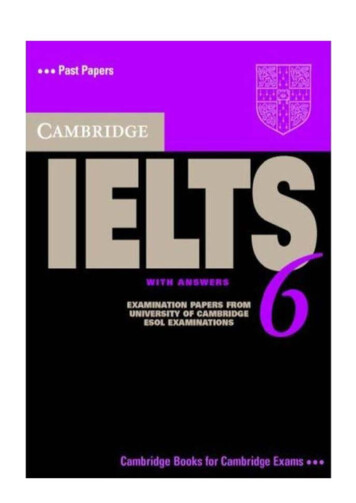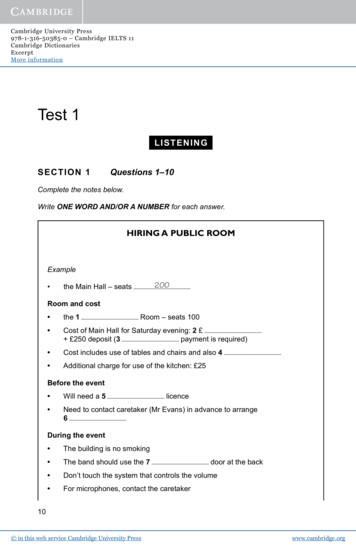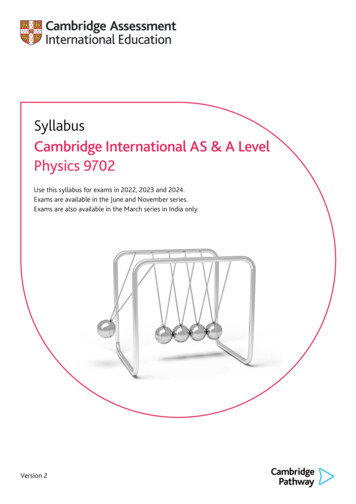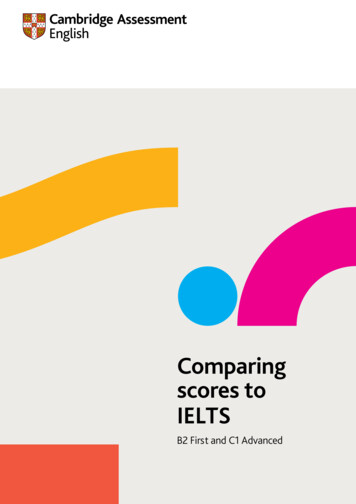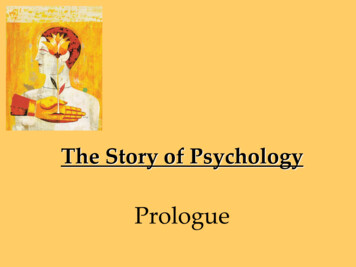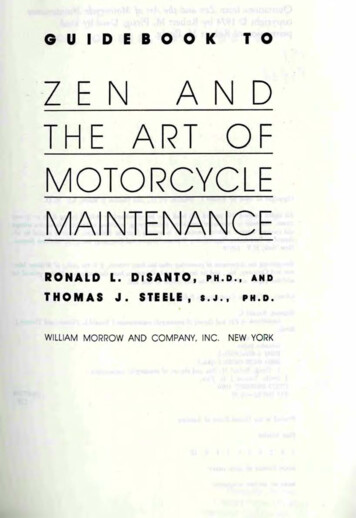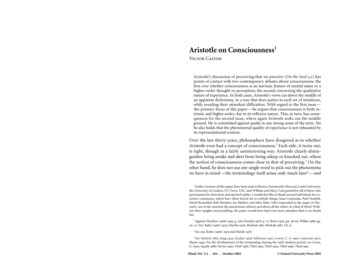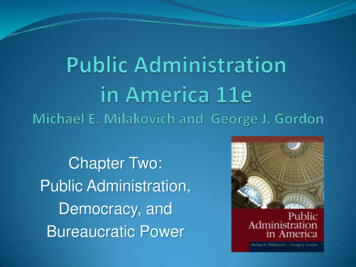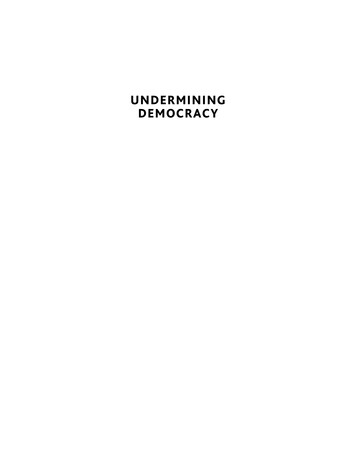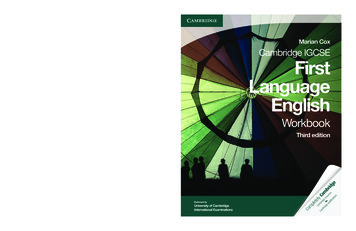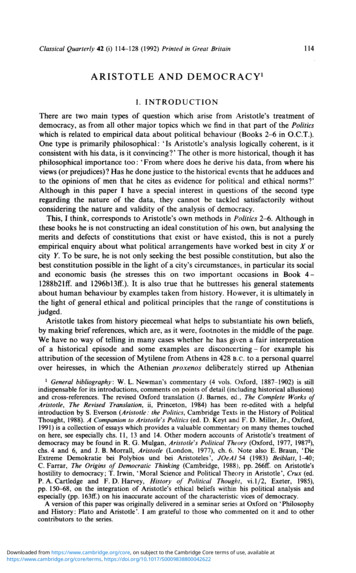
Transcription
Classical Quarterly 42 (i) 114-128 (1992) Printed in Great Britain114ARISTOTLE AND DEMOCRACY11. I N T R O D U C T I O NThere are two main types of question which arise from Aristotle's treatment ofdemocracy, as from all other major topics which we find in that part of the Politicswhich is related to empirical data about political behaviour (Books 2-6 in O.C.T.).One type is primarily philosophical: ' Is Aristotle's analysis logically coherent, is itconsistent with his data, is it convincing?' The other is more historical, though it hasphilosophical importance too: ' From where does he derive his data, from where hisviews (or prejudices)? Has he done justice to the historical events that he adduces andto the opinions of men that he cites as evidence for political and ethical norms?'Although in this paper I have a special interest in questions of the second typeregarding the nature of the data, they cannot be tackled satisfactorily withoutconsidering the nature and validity of the analysis of democracy.This, I think, corresponds to Aristotle's own methods in Politics 2-6. Although inthese books he is not constructing an ideal constitution of his own, but analysing themerits and defects of constitutions that exist or have existed, this is not a purelyempirical enquiry about what political arrangements have worked best in city X orcity Y. To be sure, he is not only seeking the best possible constitution, but also thebest constitution possible in the light of a city's circumstances, in particular its socialand economic basis (he stresses this on two important occasions in Book 4 1288b21ff. and 1296bl3ff.). It is also true that he buttresses his general statementsabout human behaviour by examples taken from history. However, it is ultimately inthe light of general ethical and political principles that the range of constitutions isjudged.Aristotle takes from history piecemeal what helps to substantiate his own beliefs,by making brief references, which are, as it were, footnotes in the middle of the page.We have no way of telling in many cases whether he has given a fair interpretationof a historical episode and some examples are disconcerting - for example hisattribution of the secession of Mytilene from Athens in 428 B.C. to a personal quarrelover heiresses, in which the Athenian proxenos deliberately stirred up Athenian1General bibliography: W. L.Newman's commentary (4 vols. Oxford, 1887-1902) is stillindispensable for its introductions, comments on points of detail (including historical allusions)and cross-references. The revised Oxford translation (J. Barnes, ed., The Complete Works ofAristotle, The Revised Translation, ii, Princeton, 1984) has been re-edited with a helpfulintroduction by S. Everson (Aristotle: the Politics, Cambridge Texts in the History of PoliticalThought, 1988). A Companion to Aristotle's Politics (ed. D. Keyt and F. D. Miller, Jr., Oxford,1991) is a collection of essays which provides a valuable commentary on many themes touchedon here, see especially chs. 11, 13 and 14. Other modern accounts of Aristotle's treatment ofdemocracy may be found in R. G. Mulgan, Aristotle's Political Theory (Oxford, 1977, 19872),chs. 4 and 6, and J. B. Morrall, Aristotle (London, 1977), ch. 6. Note also E. Braun, 'DieExtreme Demokratie bei Polybios und bei Aristoteles', JOeAI 54 (1983) Beiblatt, 1-40;C. Farrar, The Origins of Democratic Thinking (Cambridge, 1988), pp. 266ff. on Aristotle'shostility to democracy; T. Irwin, 'Moral Science and Political Theory in Aristotle', Crux (ed.P. A. Cartledge and F.D.Harvey, History of Political Thought, vi.1/2, Exeter, 1985),pp. 150-68, on the integration of Aristotle's ethical beliefs within his political analysis andespecially (pp. 163ff.) on his inaccurate account of the characteristic vices of democracy.A version of this paper was originally delivered in a seminar series at Oxford on ' Philosophyand History: Plato and Aristotle'. I am grateful to those who commented on it and to othercontributors to the series.Downloaded from https://www.cambridge.org/core, on subject to the Cambridge Core terms of use, available athttps://www.cambridge.org/core/terms. https://doi.org/10.1017/S0009838800042622
ARISTOTLE AND DEMOCRACY115hostility to Mytilene (5.1304a4ff.) - something that we would not have guessed fromThucydides.2Nevertheless, although we may be suspicious of the accuracy of individualhistorical items he cites, or question their validity as instances of a generalphenomenon, the problems he confronts in the Politics largely arise from humanexperience and so do many of the solutions offered: the objects studied in the Politicsare thus on the whole empirical, even if the values by which Aristotle judges them arehis own theoretical construct. With regard to democracy this produces a specialtension. Even if the Athenaion Politeia was not actually written by him but by a pupil(who adapted or garbled some of the statements in the Politics),3 he was wellacquainted with the Athenian constitution of his own day - not only theconstitutional details, but the principles underlying them (cf. 6.1317a40ff.)-and hedetails in the Politics a historical account of the development of the Atheniandemocratic constitution (2.1274b35ff.), which in fact he almost certainly accepts astrue. His hostility to the ' extreme' democracy characteristic of Athens from the time of Ephialtes (2.1274a7ff., 4.1292a4ff., 1298a28ff., 6.1319blff.) appears at many pointsfrom his preliminary classification of constitutions (3.1279a21ff.) onwards. Yet there' is a coincidence between a major principle of this democracy, that of' ruling and beingruled in turn' (6.1317b2) and Aristotle's own belief that a city should involvethe participation of all its citizens in government (2.1261a22-1261b6, cf.3.1275a22—1275b21 - the argument used in reverse to define the nature of the citizen).Furthermore, Aristotle produces a strong argument for majority rule among thecitizens, in so far as their collective decisions in an assembly are based on a greaterquantity of wisdom than that of a few experts (3.1281a40ff.).What I would like to show here is, first, how Aristotle's theoretical approach todemocracy and his practical experience of democracy have become intertwined, andsecondly, how in spite of his hostility to 'extreme' democracy as a constitution,certain features of Athenian democratic experience have influenced him positively,even if those derive less from his immediate experience than from traditions aboutAthens' past; it is this which makes his treatment of democracy more understanding. and appreciative than we would expect. There is always in the Politics the problemof how far Aristotle is expounding his own view, how far giving a run to other1people's ideas. It will, I hope, become clear that his argument for majority decisions, is powerful and that, although he initially distances himself from the first account hegives of the development of Athenian democracy - a decline from a golden age in' Solon's time -, he ultimately endorses this view himself.II. T H E T H E O R Y O F D E M O C R A C Y(a) The definitions of democracy and oligarchyOur starting-point must be Aristotle's taxonomy of constitutions, found first in. Nicomachean Ethics (8.1160a31ff.) and then in Politics (3.1279a21-bl9). In the EthicsAristotle lists, in order of preference, the good constitutions of monarchy, oligarchyJand politeia (the last of which is said to be his preferred term for what is more,i!Thuc. 3.2-5; 10-14. Cf. A. Lintott, Violence and Civil Strife in the Classical City (London,1982), pp. 105-6, 241.3For a discussion of various arguments relevant to this question see P. J. Rhodes, ACommentary on the Aristotelian Athenaion Politeia (Oxford, 1981), Introduction, esp. pp. 10-15,58ff. Note also what seems to be a misunderstanding of Pol. 5.1303a in Ath. Pol. 26.1 and therather clumsy interpretation of the doctrine in Pol. 3.1274a7ff. and 5.1304a20ff. to be found inAth. Pol. 23.1 and 25.1.Downloaded from https://www.cambridge.org/core, on subject to the Cambridge Core terms of use, available athttps://www.cambridge.org/core/terms. https://doi.org/10.1017/S0009838800042622
116ANDREW LINTOTTcommonly called timokratia), followed by the bad constitutions of democracy,oligarchy and tyranny. Democracy is there the least bad of the second group and notfar removed from politeia, but oligarchy and tyranny are characterised by the pursuitof private interest rather than the common good. The two triads reappear in thePolitics, but here, while the 'correct' constitutions have the common good as theiraim, all the 'deviations' (parekbaseis) are said to neglect koinonia, community orpartnership, in favour of allowing the rulers to pursue their own interests. In the badtriad of tyranny, oligarchy and democracy, the first is characterised by the despotismof one ruler, the second by the power of the wealthy and the third by the power ofthe poor, who pursue the interest of the poor.An immediate problem arises in the Politics over the related definitions of oligarchyand democracy (3.1279b20ff.). Suppose that a majority (plethos) rule, when they arewealthy, or conversely that a minority rule, who are poor. Such societies apparentlycannot be defined at all according to Aristotle's terms, or their definitions involve acontradiction. Aristotle here takes a firm position. For him the fact that the 'many'have power in a democracy and the ' few' in an oligarchy is an incidental factor. Thereal difference lies in the contrasting ideologies of the two constitutions. In oligarchywealth is the criterion for status, in democracy the possession of freedom, which is theasset of all citizens including the poor (1279b34-80a6). Both rich and poor, inAristotle's view (1280al6-25, cf. 5.1301a25ff.), make the mistake of overgeneralisingtheir appreciation of their own status: in oligarchies the rich think that because theyare unequal (that is, superior) in one respect, i.e. wealth, they are unequal in allrespects; in democracies the poor think that because they are equal in one respect,freedom, they should be equal in all respects.When Aristotle is dealing with the ' correct' constitutions, the number of rulers isthe fundamental criterion. However, in his discussion of the deviant ones in thePolitics, he abandons this criterion, when speaking of oligarchy and democracy, sodiscarding a neat theoretical parallelism in order to explain more satisfactorily howoligarchy and democracy deviate from the norm of the pursuit of the common interestand how these two constitutions are antitheses of each other. In other words he ispointing out that these two constitutions are based on the pursuit of two opposedclass-interests, something which reflects the perception of oligarchic and democraticbehaviour in the Greek world since the mid-fifth century (cf. 4.1296b22ff. with itsThucydidean echoes).4The reason that Aristotle gives for rejecting the oligarchic perception of society(1280a25ff.) is that it entails a view of koinonia which is based on wealth, like abusiness partnership. If the purpose of those who joined in a city was merely living,or mutual defence (summachid) or the protection of economic exchanges in order toavoid injustice, then the oligarchic view, according to which the status of theparticipant depended on his contribution in resources, would have some force, sincesociety would be no more than a guarantor for the protection of the participants' justinterests. However, it is a different matter if the purpose of a city is happiness andmoral life or, to put it another way, to make citizens good and just. This is whatcharacterises the true polis and differentiates it from an alliance of peoples accordingto a suntheke (compact) or a geographical conglomerate.5 It is beginning to appear4Lintott [n. 2], chs. iii-viii, esp. pp. 90ff., 242ff. A more theoretical treatment is G. E. M. deSte. Croix, The Class Struggle in the Ancient Greek World (London and Ithaca, 1981), withparticular reference to Aristotle at pp. 69-80 and to the classical Greek city at pp. 278-300.5For the fundamental importance of koinonia in Aristotle's politico-ethical theory, whichprovides a different basis for rights than the state-of-nature ethical' atomism' of Locke and hisDownloaded from https://www.cambridge.org/core, on subject to the Cambridge Core terms of use, available athttps://www.cambridge.org/core/terms. https://doi.org/10.1017/S0009838800042622
ARISTOTLE AND DEMOCRACY117that Aristotle's conception of the city as a community conceived for the active pursuitof the good life not only has negative implications for oligarchy, but may havepositive implications regarding democracy. One may relate to this the part of thediscussion in Book 2 (1261a-b), where he argues against Plato that a city is of itsnature a diversity, and hence that it is preserved by reciprocal equality and by theparticipation of all in turn in government - a principle which he recognises in Book6 as a major feature of democracy. Thus two different ethical arguments tend tosuggest that the true polis is a species of democracy, even if this is not the democracybased on class-interest already classified as a deviant constitution. 6This becomes clearer in the discussion in Book 3, following that about koinonia,which concerns the sovereign body in the city. Aristotle begins with a typicaloligarchic nightmare: ' Well then, suppose the poor divide up the wealth of the richthrough being a majority, isn't that unjust?' ' N o ' , they will say, 'for it was the justdecision of the sovereign body' (1281al4ff.). After arguing that such a move woulddestroy the city and is therefore unjust, Aristotle nevertheless advances the view(1281a40ff.) that it is better for the masses to be sovereign than the best men, who arefew, on the ground that a large assembly, by pooling its understanding and virtue, ismorally superior and more intelligent than a small group of good men -just as theyare better judges of music and drama. It is clear that the spoken and unspokenassumptions of Athenian public life have strongly influenced Aristotle. We maycompare the view that Plato attributes to Protagoras (Prot. 322d-323a), that allAthenian men have a share in virtue (arete), or that which Thucydides attributes tothe Syracusan Athenagoras (6.39.1), that the many are best at judging when they havelistened. In fact, Aristotle rapidly puts in a caveat: what he has said does not applyto every mass of people (how indeed do some masses differ from beasts?); yet it is trueof some. He then suggests a compromise: the masses should have a share indeliberation and judicial work, as Solon laid down. For one thing it is dangerous toprevent them participating (1281b27ff.); for another, even if they have not theknowledge characteristic of a man with a special skill (techne), they may judge betteras users and consumers (1282al4ff.). It should be noted that because in the assemblythe mass are acting as a collective, this justifies their being assigned power, which it' would be inappropriate to give to their members as individuals.One further argument deserves notice. In the discussion of justice, which arises outof this, the issue is whether certain members of the community deserve unequal rights- because of some superior capacity (1282bl4ff.). Aristotle seeks to show that all claimsadvanced by certain classes in society for an unequal share in office and power onaccount of their superiority in one respect may be subverted. One can neither decide which form of superiority should be decisive, nor transfer superiority from one field to another, nor make superiorities in different fields commensurable. This rules outclaims for preference in office by the well-born, or the landowners, for example- (1283a31ff.). A somewhat different argument applies to the masses (plethos) and thefew (1283b23—35). If the mass claims to rule through having superior power, this' factor may equally justify rule by a few or a single man. Conversely, if certain men, claim to rule on account of virtue or wealth, the mass as a whole may be more wealthyor virtuous than they.followers, see S. Everson, 'Aristotle on the Foundation of the State', Political Studies 36 (1988),89-101. Of course the idea that a community is simply some kind of compact or alliance wasalready current in Greece, as Aristotle points out at 1280bl0ff., cf. Keyt in Keyt and Miller [n. 1],pp. 252-3. For the concept of 'atomism' see C. Taylor, Philosophy and the Human Sciences.6Philosophy Papers 2 (Cambridge, 1985), ch. vii.Everson [n. 5], p. 90 n. 2.Downloaded from https://www.cambridge.org/core, on subject to the Cambridge Core terms of use, available athttps://www.cambridge.org/core/terms. https://doi.org/10.1017/S0009838800042622
118ANDREW LINTOTTiTwo things emerge from these preliminary discussions of democracy. First, itfollows logically from Aristotle's conception of the polis that the plethos, the mass ofcitizens, has a part to play in running a city. Secondly, Aristotle takes it to be a matterof fact that the mass tends to pursue its class interest, and not that of the communityas a whole, unless it is restrained. It is because of this that he lists democracy as adeviant constitution and he introduces the conception of a politeia as a constitutionwhere the mass rules but pursues the interest of the city as a whole (1279a37-b3). Heargues that it is difficult for a majority of a city's population to be virtuous in everyrespect, but this can be found in relation to military virtue. Hence it follows that ina politeia the sovereign power is the armed forces. It looks as if at this point Aristotlehas adapted and renamed the concept of timokratia, the qualified democracy ofproperty-holders (cf. EN 8.1160a33-6), who are also hoplite soldiers, so that it mayembody the theoretical virtues of democracy.7 In this way he can extract himself fromsome of the contradictions into which his views on democracy are leading him.i*(b) Variants of democracy: the social basisIj,- In Book 4 Aristotle sets out to discuss his politeia and the three deviant constitutions jwith two standards in mind, the ideal and that which is contingent on thecircumstances of the city and, so to say, customer-oriented. Aristotle makes it clearat the start that the basic categories of city-constitution are in themselves inadequate jbases for analysis. Cities vary according to their social composition, and this affects j which constitution should be chosen either by them themselves or by a legislator Lworking on their behalf (1289b27ff.). Later, societies as a whole are analysed into Idifferent classes - such as the farmers, artisans, warriors and the deliberative class, as K well as the rich and poor - on the understanding that these elements are the variables, whose conjunction in differing forms creates the varieties of city, just as differing Iphysical organs in conjunction create different animals (1290b21-1291bl3).SDemocracy is here classified as the most moderate of the bad constitutions i.(4.1289b2ff.), as in the Ethics (8.1160b7ff.). (The view of Plato (Politicus 302aff.)that ithere could be a good form of all constitutions and democracy was the worst of these, ( but the best of all the bad forms, is rejected, on the ground that there cannot be good forms of bad constitutions). The definition of democracy (1290a30-b20) is consistent fwith the arguments of Book 3 (1279b-80a). It is not the rule of the mass (plethos) (a r" majority of citizens rule even in an oligarchy): it is the rule of the free and poor, when fc,they are in the majority. Varieties of democracy are analysed in more than one way. tThe common people (demos) itself is subdivided (1291bl4—28) into classes such as the Vfanners (georgoi), the craftsmen (to peri tas technas or banauson), the traders (to agoraion, to peri onen kai prasin diatribon) and those involved with the sea, like ferrymen and fishermen, merchants and warship-crews. It is implied that variationsin the presence of these classes will produce different varieties of democracy.Democracy is also classified (1291b30ff.) in a typology which follows a descending fscale from the most preferable kind, 'which gets its name from equality'. By this It.Aristotle may mean isonomia, the term used for example by Herodotus in his staged 7Politeiai based on hoplites had been proposed at Athens during the oligarchic revolutions i 'of 411 and 404 (see e.g. Lintott [n. 2]. pp. 153f., 164f.) and apparently even after the restoration Iof democracy in 403 (Lysias 34). On the general argument in this passage see also W. vonLeyden, Aristotle on Equality and Justice (Basingstoke, 1985), p. 17-25, stressing the qualitativedifferentiation between rich and poor and the arguments for democracy rather than rule byexperts. t.Downloaded from https://www.cambridge.org/core, on subject to the Cambridge Core terms of use, available athttps://www.cambridge.org/core/terms. https://doi.org/10.1017/S0009838800042622W.
ARISTOTLE AND DEMOCRACY1198debate about the relative merits of different constitutions. This preferable type ofdemocracy is designed to hold the balance between rich and poor, so that neither rulesthe other. Decisions are by majority, but, it is implied, the power of the wealthy isentrenched in some way. This seems in some respects to correspond to the Cleisthenicconstitution at Athens, that in force at the time of the Persian Wars, where, accordingto both Aristotle and the Athenaion Politeia, the influence of the Areopagus wasmaintained.9 The Ath. Pol. also tells us that, on the eve of the oligarchic revolutionof 411, Cleitophon proposed that a commission should study the laws of Cleisthenes,on the ground that they were more like the ancestral constitution (see below, p. 123,125-126).10 Aristotle himself does not clearly characterise Cleisthenes' constitution inthe Politics.11Of the other types on Aristotle's descending scale, the second has offices based onproperty-qualifications, though these are small; the third allows all citizens who areanupeuthunoi (not liable to trial) to hold office (4.1292a2).12 In this kind of democracythe law is said to be sovereign. The same is true of the fourth type, where the wholecitizen body is allowed office. Finally, there is the type of democracy where not thelaw, but the mass (plethos), is sovereign, that is, where psephismata override nomos.This occurs because of demagogues. Lawful democracy does not give scope for ademagogue, but the best of the citizens preside over it. This democracy, by contrast,because it is not ruled, becomes a tyrannical monarch itself (1292a4-38).13Aristotle clearly intends this type of democracy to represent what is essentiallycorrupt about democracy. It is at first sight surprising that he lays such stress on theloss of the sovereignty of nomos. For earlier (3.1281a34ff.), he has suggested that thesovereignty of law does not eliminate class-strife: laws themselves may haveoligarchic or democratic tendencies. This discussion reflects the debate in Athens over8I differ from the Oxford translation here and hence, in my interpretation, from Mulgan (inKeyt and Miller [n. 1], pp. 307-22 at 318f.), at least in part. Mulgan rightly compares6.1318a3ff., where Aristotle refers to what seems to him to be the most democratic democracy,in which the poor have no more share of government than the rich, but then argues that this typeof democracy is less moderate than the second type where magistrates are required to have asmall property-qualification. I do not see how this follows, since a small property-qualification(such as the opening of the archonship at Athens to all but the thetes in Pericles' time ofascendancy) would not have entrenched the share in government of the rich. On isonomia seeHdt. 3.80.6, 142.3; 5.37.2; cf. Thuc. 3.82.8; 4.78.2-3; LGS447, 450 (Athen. Deip. 15.695a-c);M. Ostwald, Nomos and the Beginnings of Athenian Democracy (Oxford, 1969), pp. 149-58;G. Vlastos,' Isonomia Politike" in ISONOMIA : Studien zur Gleichheitsvorstellung in griechischenDenken, ed. J. Mau and E. G. Schmidt (Berlin, 1964), pp. 1-35.9Pol. 3.1274a7ff.; 5.1304a20ff.; Ath. Pol. 23.1; 25.1. Although I accept Vlastos' [n. 8]powerful argument that isonomia denotes an egalitarian ideal ('a banner rather than a label')only properly realised by democracy, I believe it possible that Aristotle was influenced here bythe tendentious use of the term for regimes which were not fully democratic but aspired toequality on their own terms (cf. Isoc. Pan. 178; Areop. 60-1; Thuc. 3.62.3-4). See alsoM. H. Hansen, The Athenian Democracy in the Age of Demosthenes (Oxford, 1991), pp. 65-71for an account of Aristotle's typology of democracy and a critique of the view that isonomia was10the original official term for democracy.Ath. Pol. 29.3.11He only refers to the tribal refom (6.1319b21ff.) and the enfranchisement of metics(3.1275b35ff.).12The Oxford translation renders anupeuthunoi 'under no disqualification'. Newman (vol. ivadlocc) compared 1292a2 with 1292b35, from which it appears that we must supply in the firstpassage 'kata to genos' ('in respect of their birth'). The term presumably refers to people notactually deprived of citizen rights but to whom objection might be made (the sort of peoplediscussed in Ath. Pol. 13.5 & 21.2). Hence Aristotle is assuming that a stricter birth-qualificationmight be applied to officers of the city than to members of the assembly.13Newman appropriately compared the speech addressed to the character Demos in Ar.Knights 111 Iff.Downloaded from https://www.cambridge.org/core, on subject to the Cambridge Core terms of use, available athttps://www.cambridge.org/core/terms. https://doi.org/10.1017/S0009838800042622
120ANDREW LINTOTTythe sovereignty of a single meeting of the assembly (ekklesia). Aristotle seems to be endorsing the constitution of the democracy after its refoundation in 403, with which \he was directly acquainted, where indeed nomoi could not be overthrown by simple ',decisions of the ekklesia, but could only be rescinded or supplemented by acommission of lawgivers, whose conclusions were assessed in the popular law-court(dikasteriori). However, he himself does not draw any distinction between fifth- and fourth-century democracy here, and in a later passage (1298b28ff.) he specificallystates that his most extreme form of democracy is the one currently in use in Athens.14He should have been particularly opposed to the practice of the age of Thucydides, where there were inadequate safeguards against the assembly taking the law into itsown hands. The classic example of this was the trial of the generals after the battleof Arginousai in 406 by procedure devised ex tempore, which was put into effect after t.threats against any who tried to obstruct it - both speakers and the presidents of theassembly. The one president who persisted unsuccessfully in resistance was Socrates.15These grades of democracy are, at least in part, related to the possession of supreme [power by certain classes (1292b25ff.). Democracy according to law is associated first \with the supremacy of the farmers and those possessing a moderate amount ofproperty (because the farmers have to work, they only attend the minimum number iof assemblies required). But it is also possible when ultimate power lies with those ,with irreproachable descent or even with all free men, provided that only those who rhave the requisite leisure participate and there is no state revenue to support them i.without their having to work. However, in the final category (1292b41fF.), where the Icity is large and prosperous, all men share in citizenship" on account of the supremacy rof the masses and participate because they receive pay and so can afford time off Iwork.IOnce again, the influence of Athenian history is patent. Aristotle takes as one of his icriteria an important feature of Athenian democracy from the time of Periclesonwards-one much attacked by democracy's critics. The elimination of pay \(misthos) was central to the oligarchic programme of 411 and this part of the programme was reaffirmed by the 'moderate' constitution of 5,000. After theconvulsions of the late fifth century, pay was once again a feature of fourth-century ldemocracy and its scope and quantity were extended.16 For Aristotle misthos, itseems, is dangerous on two grounds: it attracts the wrong kind of person to theassembly and it makes him a dependant of the demagogues.IAristotle goes on to talk briefly about thepoliteia (1293b22ff.). This is now depicted jas a mixture of oligarchy and democracy, with the proviso that people in fact applythe term to mixtures which tend to the democratic, while those tending to theoligarchic are called aristocracy. This general definition is amplified by an expositionof how through different modes of operation this constitution may become acomposite (1294a30ff.). One method is to combine the standard precepts of oligarchy11Nomothesia is likewise not mentioned in Ath. Pol., unless it was in the lost section at theend after the discussion of voting in the law-courts. Instead, the author (41.2) stresses theretention of sovereignty by the demos, whether it was operating through the assembly or lawcourts. Basic sources for the nomothesia procedure are Dem. 24.20-3, 38; Aesch. 3.38-40, cf.M. H. Hansen, The Sovereignty of the People's Court in Athens in the Fourth Century B.C.(Odense, 1974); Id. The Athenian Assembly in the Age of Demosthenes (Oxford, 1987), pp. 98,15174.Xen. Hell. 1.7.9ff.; Plato, Apol. 32a-b.16Agyrrhios reintroduced assembly-pay at 1 obol a day, Heracleides of Clazomenai raised itto 2 obols and Agyrrhios raised it again to 3 (Ath. Pol. 41.3). All this occurred between 403 andthe production of Ar. Ecc. (393-390 B.C.), cf. lines 289-311, 392. Later, before Ath. Pol. waswritten, the rate was raised to 9 obols at the main a
Classical Quarterly 42 (i) 114-128 (1992) Printed in Great Britain 114 . which is related to empirical data about political behaviour (Books 2-6 in O.C.T.). One type is primarily philosophical: ' Is Aristotle's analysis logically coherent, is it . A version of this paper was originally delivered in a semi
